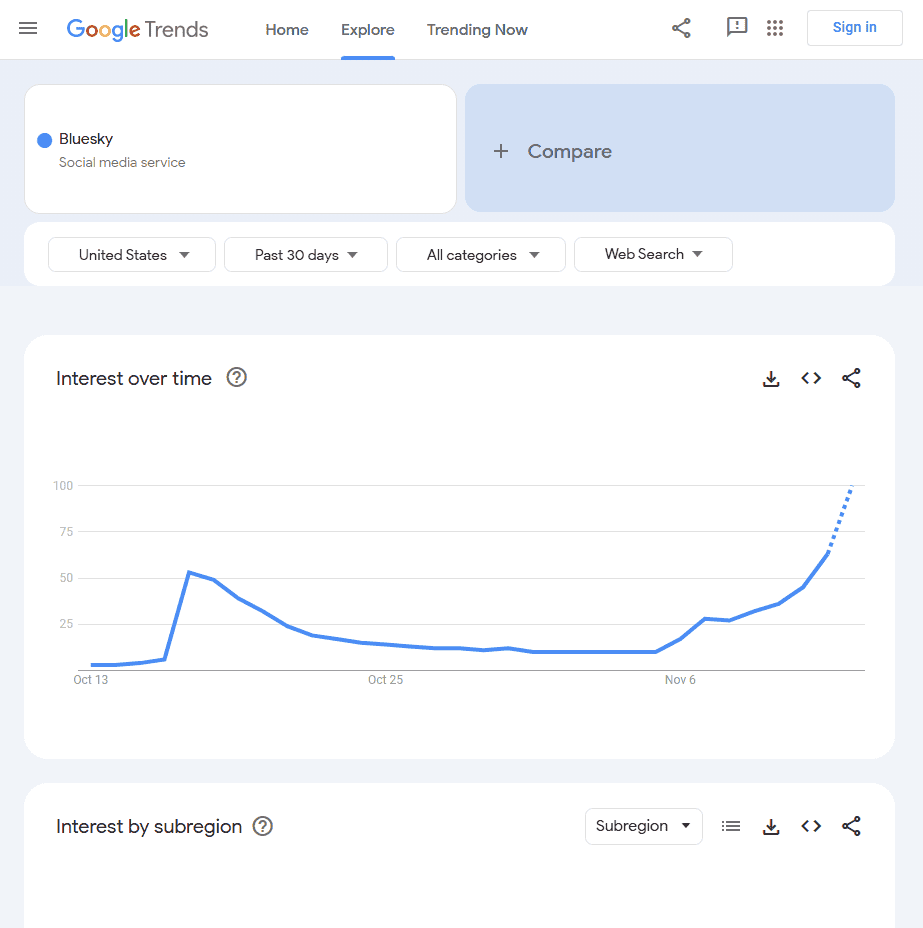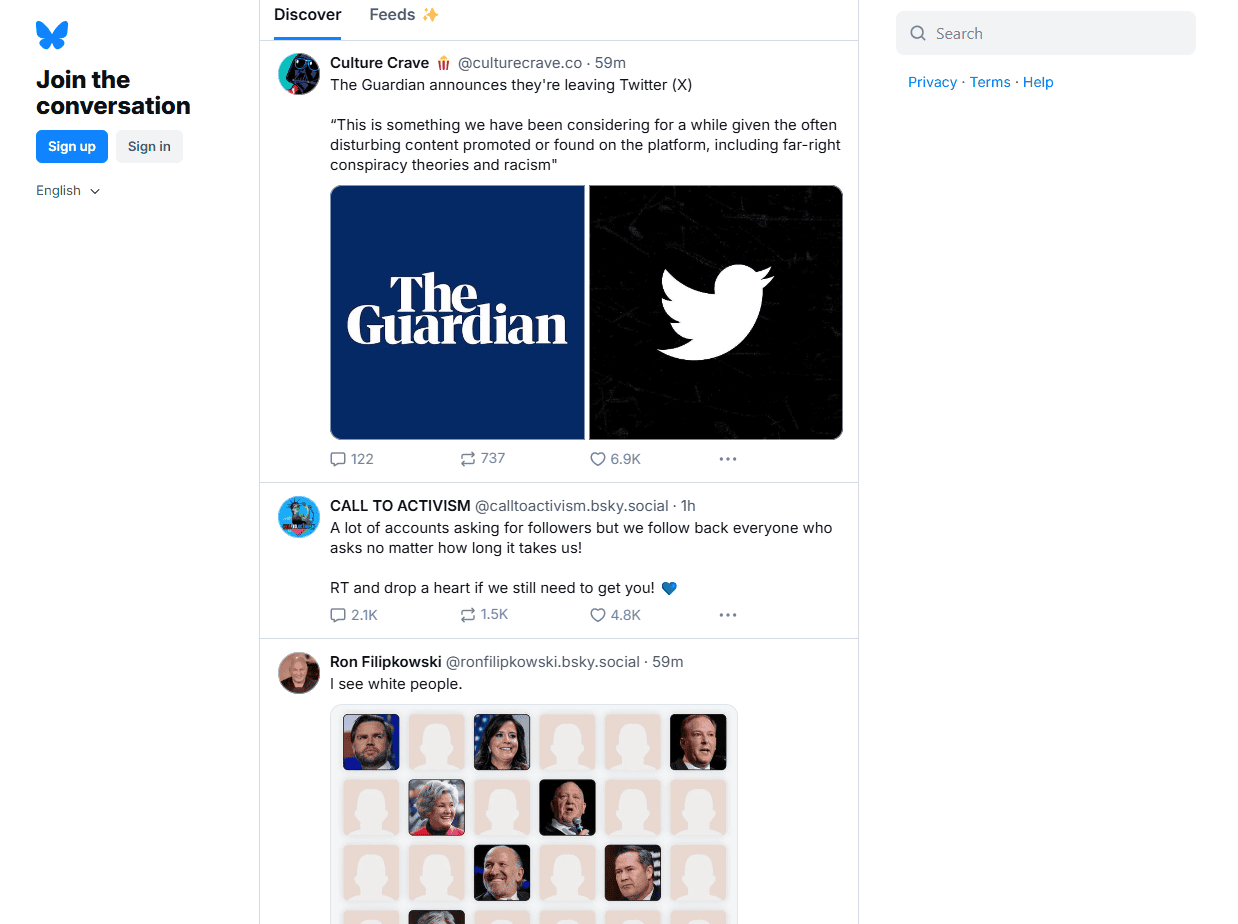Bluesky Social has gained a huge influx of users after recent events (post-election). In just one week, it added one million new sign-ups, bringing its total to over 15 million users. While that may not seem like a lot, the momentum to cancel X and switch over to BlueSky or alternatives like Threads by Meta seems to only be growing.
Bluesky is attracting these users because it is easy to use and decentralized – and to a lot of people, it looks like and fees a lot like the old Twitter we all grew to love. Those leaving have been taking to forums like Reddit to express their disappointment with recent changes on X and want a more positive and controlled social media experience.

The trend of users switching to Bluesky has become especially clear after the U.S. elections. Users have shared concerns about X’s management and policies as reasons for leaving. Bluesky’s focus on decentralization and user privacy appeals to those wanting a fresh start in social media. This shift shows how quickly social media preferences can change. Bluesky’s rapid growth suggests it could become a major player, competing with well-known platforms like X, Facebook, and Instagram.
This article will explain why users are moving to Bluesky, highlight its main features, and discuss what this means for the future of social media.
The Bluesky Exodus: Why X Users Are Flocking to a New Social Media Haven
Bluesky, the decentralized social media platform, is experiencing a surge in popularity as users leave X (formerly Twitter) in significant numbers. This migration is driven by various factors, including dissatisfaction with X’s recent changes and Bluesky’s unique features.
Reasons for the Exodus
Many users have expressed discontent with X’s evolution under Elon Musk’s ownership. Policy changes, the platform’s rebranding, and a perceived increase in negativity have led some users to seek alternatives. Bluesky presents a decentralized and potentially less chaotic environment. Its focus on combating toxicity and its user-friendly interface appeal to those seeking a different social media experience.
Bluesky’s Growth
Bluesky has seen a remarkable increase in its user base:
- Over 700,000 new users joined Bluesky in the week after the US presidential election.
- Bluesky reached 10 million users in September 2024.
- Bluesky now boasts over 14.5 million users.
These numbers indicate a growing trend of users embracing alternative social media platforms.
What Makes Bluesky Different
Several key features differentiate Bluesky from X:
- Decentralization: Bluesky operates on a decentralized network, giving users more control over their data and experience.
- Anti-toxicity measures: The platform actively combats harassment and negativity, promoting a more positive environment.
- User-friendly interface: Bluesky offers a simple and intuitive design that is easy to navigate.
- Portability: Users may have the option to transfer their data to other platforms, providing flexibility and control.
A Shift in the Social Media Landscape
The rise of Bluesky reflects a broader shift in the social media landscape. Users are increasingly exploring alternatives to established platforms like X and Facebook. This trend highlights a desire for more control, positivity, and diverse options in the social media experience.
The Future of Social Media
| Feature | X (formerly Twitter) | Bluesky |
|---|---|---|
| Structure | Centralized | Decentralized |
| Content Moderation | Algorithmic and human review | Community-based and algorithmic |
| Focus | Real-time updates and discussions | Long-form content and community interaction |
| User Control | Limited | Greater control over data and experience |
The growing popularity of platforms like Bluesky suggests that the future of social media may be more decentralized and community-driven. Users are seeking platforms that align with their values and provide greater control over their online interactions.

The Role of Social Media in Society
Social media platforms have become integral to how people communicate, consume information, and engage with the world. They can facilitate social movements, enable global conversations, and provide a platform for diverse voices. However, social media can also contribute to the spread of misinformation, online harassment, and political polarization. As social media evolves, it’s essential to consider its impact on society and promote responsible usage.
Key Takeaways
- Bluesky gained 1 million new users in a week, reaching over 15 million total users
- The platform’s growth is linked to users leaving X after recent political events
- Bluesky’s decentralized approach appeals to users seeking alternative social media options
Emergence of Bluesky as a Digital Sanctuary
Bluesky has rapidly gained popularity as users seek alternatives to established social media platforms. The platform’s growth reflects shifting preferences in online communication and community building.
Comparative Analysis with Giants Like Twitter and Facebook
Bluesky’s user base has surged, reaching 14.5 million in November 2024. This growth contrasts with X’s (formerly Twitter) 225 million monthly users. Facebook, while still larger, has seen user engagement decline.
Bluesky’s appeal lies in its decentralized structure. This approach differs from the centralized control of X and Facebook. Users appreciate Bluesky’s commitment to open-source technology.
The platform has benefited from high-profile endorsements. Alexandria Ocasio-Cortez and Taylor Swift have publicly supported Bluesky. Their influence has attracted more users to the platform.
Features and Innovations Attracting Users
Bluesky offers unique features that set it apart. The platform’s decentralized nature allows for greater user control. This appeals to those concerned about data ownership and privacy.
The platform’s algorithmic transparency is a key selling point. Users can understand and influence the content they see. This contrasts with the opaque algorithms of X and Facebook.
Bluesky’s invite-only system has created an air of exclusivity. This has fueled interest and growth, despite limiting rapid expansion.
The Significance of Privacy and Moderation Policies
Bluesky’s privacy policy emphasizes user data protection. The platform collects minimal personal information. This approach contrasts with the data-heavy practices of X and Facebook.
Moderation on Bluesky aims to balance free speech with user safety. The platform addresses issues like misinformation and hate speech proactively. This approach has reduced instances of harassment and safety concerns.
Bluesky’s terms of service prioritize user rights. The platform’s commitment to transparency extends to its policies. Users have praised this clear communication of rules and expectations.
User Experience and Network Dynamics
Bluesky’s surge in popularity stems from its unique features and the shifting social media landscape. Users are drawn to its decentralized structure and enhanced control over their digital interactions.
Impact of Celebrity and Influential Figures
High-profile individuals have significantly influenced Bluesky’s growth. After Donald Trump’s election victory, many prominent users migrated from X to Bluesky. This exodus led to a ripple effect, encouraging their followers to make the switch. Celebrity endorsements and active participation have boosted Bluesky’s credibility and appeal.
The platform’s user-friendly interface and commitment to free speech have attracted journalists, politicians, and thought leaders. These influential figures bring their audiences, sparking conversations and increasing engagement on Bluesky.
Growth Metrics and User Engagement
Bluesky’s user base has expanded rapidly, with 1 million new accounts added in the week following the U.S. presidential election. This growth outpaces competitors like X, which has seen a decline in active users.
The platform’s app store rankings have soared, reaching the top spot in the U.S. chart. Daily active users and time spent on the app have also increased. Bluesky’s engagement rates are strong, with users actively participating in discussions and sharing content.
Custom feeds and improved content discovery tools have enhanced user retention. The platform’s block function and moderation tools provide a safer environment, contributing to user satisfaction.
Evaluating Technological Ecosystems: ActivityPub and AT Protocol
Bluesky’s technological foundation sets it apart from traditional social media platforms. The AT Protocol, developed by Bluesky, offers users greater control over their data and online identity.
This protocol allows for interoperability with other decentralized networks, potentially connecting Bluesky users with platforms like Mastodon. The system’s federated nature provides enhanced privacy and data portability.
ActivityPub, another decentralized protocol, complements Bluesky’s ecosystem. It enables cross-platform communication and content sharing. This technological approach fosters a more open and user-centric digital space, appealing to those seeking alternatives to centralized social media giants.
Frequently Asked Questions
Bluesky’s rise in popularity stems from several key factors that differentiate it from other social media platforms. Users are drawn to its unique features and approach to data privacy.
What are the primary reasons users are transitioning from existing platforms to Bluesky?
Users are moving to Bluesky due to concerns about privacy and content moderation on other platforms. Many are seeking a more open and decentralized social media experience.
Bluesky’s commitment to user control and data portability appeals to those frustrated with centralized platforms. The platform’s promise of a more transparent and user-centric approach is attracting new users.
How does Bluesky’s approach to social media differ from traditional platforms?
Bluesky uses a decentralized protocol called the Authenticated Transfer Protocol (ATP). This allows users to move their data and social connections between different providers.
The platform aims to give users more control over their online presence. It offers customizable feeds and moderation tools, enabling a more tailored social media experience.
What growth has Bluesky experienced in terms of its user base recently?
Bluesky has seen significant growth in recent months. As of October 2024, the platform reported over 10 million users.
A surge of 500,000 new users joined Bluesky in a single day following policy changes on X. This influx demonstrates the platform’s growing appeal as an alternative to traditional social media.
What implications does the surge in Bluesky’s user base have for market competition in social media?
The rapid growth of Bluesky signals a shift in user preferences towards more open and decentralized platforms. This trend could pressure established social networks to adapt their practices.
Increased competition may lead to innovation across the social media landscape. Platforms may focus more on user privacy and data control to retain their user base.
What features of Bluesky are attracting new users to the platform?
Bluesky’s decentralized nature appeals to users seeking more control over their online presence. The platform’s commitment to data portability is a key selling point.
Users appreciate Bluesky’s clean interface and chronological timeline. The absence of algorithmic manipulation in content delivery is viewed positively by many.
How is user data privacy handled differently on Bluesky compared to other social networks?
Bluesky emphasizes user ownership of data. The platform’s decentralized structure allows users to choose their service provider and move their data freely.
Privacy settings on Bluesky offer more granular control. Users can decide how their information is shared and used, providing a level of transparency often lacking in traditional social media platforms.







